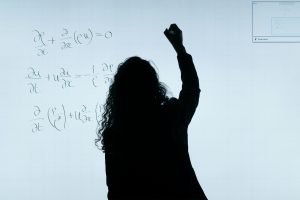Revolutionary Math Teaching Program Promises to Transform Australian Education Crisis
Failing to Meet National Standards
It’s a stark reality: nearly half of Australia’s 15-year-olds are not meeting the national mathematics standards. According to the latest Programme for International Student Assessment (PISA) results, published in December 2023, Australia’s math proficiency is critically lagging.
The nation is more than four years behind Singapore, which is the top-performing country in the world. This alarming statistic signals a substantial shortfall in Australia’s math education that demands immediate intervention.

The Education Gender Gap
Adding fuel to the fire, international assessments have brought to light a significant gender gap in math education. The 2023 Trends in International Mathematics and Science Study (TIMSS) showed that Australia has one of the largest education gender gaps among the 58 countries assessed.
This gender disparity is a critical issue that points towards underlying systemic problems in the way math is taught and absorbed by male and female students.
The Dire Situation for Disadvantaged and Aboriginal Students
For disadvantaged and Aboriginal students, the trends are even more concerning. These students are consistently underperforming in math, suggesting that the crisis isn’t just about teaching methods but also about addressing deep-seated socio-economic and cultural disparities.
The National Assessment Program – Literacy and Numeracy (NAPLAN) 2024 results showed that around one in three students were below expectations, painting a grim picture for future math competency in Australia.
The intersection of these issues—failure to meet national standards, a significant gender gap, and especially concerning results for disadvantaged and Aboriginal students—highlights the urgent need for a comprehensive restructuring of math education in Australia.
As we delve into solutions like La Trobe University’s Science of Mathematics Education (SOME) Lab, it becomes clear that addressing these deeply ingrained problems will require innovative educational strategies and robust support systems for teachers and students alike.
Introducing SOME Lab: A Revolutionary Approach
La Trobe University is making waves in the education sector with the launch of their new Science of Mathematics Education (SOME) Lab.
Following the footsteps of the successful Science of Language and Reading (SOLAR) Lab, SOME Lab aims to revolutionize how math is taught in Australia by focusing on evidence-based pedagogy and explicit teaching methods.
SOME Lab: Building on Past Success and Future Aspirations
| Aspecto | Descrição |
|---|---|
| Building on Past Success | SOME Lab builds on SOLAR Lab’s success, influencing Victorian Government policy on language and reading education. The new program adapts these methods to mathematics. |
| Evidence-Based Pedagogy | SOME Lab focuses on evidence-based teaching, breaking down math concepts into clear, logical steps, in contrast to common methods that leave students struggling. |
| Addressing Cognitive Limitations | SOME Lab understands cognitive limitations, emphasizing working memory and retention. Teaching strategies are adapted to fit these constraints for better learning outcomes. |
| Bridging the Gap | SOME Lab bridges the divide between evidence-based and inquiry-based teaching, focusing on what works best to improve student numeracy. |
| Future Aspirations | SOME Lab plans to expand its offerings, providing courses for out-of-field educators and empowering teachers to improve numeracy outcomes across Australia. |
The Science Behind Better Math Teaching
Understanding Cognitive Limitations in Learning
One key aspect of effective math teaching is recognizing how the brain processes and retains information. In learning, cognitive limitations play a crucial role. Working memory, for example, has a limited capacity; we can only hold information for about 30 seconds before it either transfers to long-term memory or is replaced by new data.
Knowing these constraints helps educators tailor their teaching strategies. According to Dr. Siobhan Merlo, director of La Trobe University’s Science of Mathematics Education (SOME) Lab, adapting pedagogical approaches to fit these cognitive limitations is critical.
By breaking down information into manageable chunks and revisiting these chunks systematically, teachers can enhance information retention and understanding.
Working Memory Capacity and Information Retention
Understanding working memory is vital for math education. To optimize retention, teachers must provide information in clear, concise segments and use repetition strategically.
This method not only improves the chances of information sticking in long-term memory but also builds a stronger foundation for more complex problem-solving tasks later on.
A Systematic Approach to Math Concepts
Breaking down mathematical concepts into smaller, more digestible parts is essential for effective learning. Australian students have traditionally struggled with math due, in part, to the lack of clarity in teaching methods.
SOME Lab is addressing this issue by promoting explicit teaching methods that clearly define each concept and illustrate how these concepts connect to solve real-world problems.
Dr. Merlo points out that math, much like a language, needs to be taught directly and systematically at first. Similar to language instruction, where you start with basic vocabulary before moving on to complete sentences, math education should begin with the fundamentals, building up to complex problem-solving gradually.
Implications for Teacher Training
For teachers to effectively implement these strategies, they need proper training. SOME Lab offers courses specifically designed to help in-service teachers understand and apply these evidence-based methods. This training is particularly crucial for out-of-field educators who may not have a strong background in math.
By training teachers to understand cognitive limitations and apply systematic teaching methods, SOME Lab aims to empower educators. This empowerment is expected to reduce the stress around math education and, in turn, foster a more positive learning environment for students.
Recognizing and addressing these cognitive limitations form the backbone of a long-term strategy to improve math education across Australia. This systematic approach promises not only to break the cycle of educational disadvantage but also to lay the groundwork for inspiring future generations of math teachers.
As we move forward, it’s important to explore how teacher preparedness and confidence play a role in transforming education outcomes.
Addressing Teacher Preparedness
- Improving math education starts with confident, well-prepared teachers. The Science of Mathematics Education (SOME) Lab at La Trobe University is focused on achieving just that.
- With nearly half of Australia’s 15-year-olds failing to meet national math standards, it’s clear that teacher preparation and support must be a top priority.
Training Programs for In-Service Teachers and Out-of-Field Educators
One of SOME Lab’s key initiatives is developing intensive training programs for both in-service teachers and out-of-field educators. Dr. Siobhan Merlo, the Lab’s director, emphasizes the importance of structured learning for educators.
This means breaking down math concepts into clear, logical steps, making them easier to teach and understand. The training programs are designed to be accessible, with short online courses that fit within the busy schedules of working teachers.
Initially, the programs will cater to in-service teachers. However, Dr. Merlo aims to extend this support to out-of-field educators in the future. This is crucial, considering many teachers are currently teaching math without a strong background in the subject. By addressing this gap, the SOME Lab hopes to provide all educators with the skills and confidence they need to succeed.
Bridging Long-Term Gaps in Teacher Education and Understanding
- An often-overlooked aspect of the education crisis is the long-term gaps in teacher education. Recent trends have shown that many educators themselves have not received adequate instruction in math during their own training. As Dr. Merlo explains, “Teachers can’t teach what they don’t understand”. This ongoing issue creates a cycle of instructional inadequacy that affects generations of students.
- To combat this, SOME Lab aims to enhance teachers’ fundamental understanding of mathematical concepts. By focusing on explicit teaching methods and evidence-based pedagogy, the Lab seeks to dispel common misconceptions and confusion surrounding math. This approach includes teaching the connections between different math concepts and the importance of systematic reasoning and problem-solving.
Empowering Teachers with Confidence and Proper Instructional Methods
Empowerment is a critical goal for SOME Lab. Many teachers report feeling unprepared for the challenges of the math classroom, which directly impacts their students’ learning experiences.
According to Dr. Merlo, understanding cognitive limitations and how the brain operates can make a significant difference in teaching effectiveness.
SOME Lab’s training emphasizes the importance of working memory and efficient information retention. By tailoring teaching methods to these cognitive constraints, educators can enhance their students’ learning outcomes. The Lab promotes low-variance, highly systematic instructional approaches, which not only improve learning but also reduce the stress and anxiety often associated with math education.
With a strong foundation in evidence-based practices, SOME Lab is committed to transforming math education in Australia. By concentrating on teacher readiness, the Lab is making a crucial move to disrupt the cycle of educational inequity and secure a brighter future for students in Australia.
Future Impact and Expectations
Long-term Strategy to Improve National Numeracy Outcomes
The SOME Lab at La Trobe University is not just another academic initiative; it is a strategic intervention aimed at reversing the troubling trends in math education across Australia.
This long-term vision focuses on enhancing the overall numeracy outcomes by equipping educators with the tools, knowledge, and confidence to deliver math instruction effectively.
By systematically addressing the gaps in teacher education and shifting the focus toward evidence-based teaching methods, SOME Lab aims to create a new standard in how mathematics is taught. This strategy acknowledges the complex cognitive processes involved in learning mathematics and provides teachers with practical approaches to break down complex mathematical concepts into more digestible pieces.
Breaking the Cycle of Educational Disadvantage
Educational disadvantage is a pervasive issue that tends to perpetuate itself unless actively addressed. SOME Lab aims to break this cycle by prioritizing marginalized and underserved communities, including disadvantaged and Aboriginal students who have historically performed poorly on national assessments.
By equipping teachers in these communities with effective, research-based teaching methods, the aim is to foster an inclusive educational environment where every student can thrive.
The impact of falling behind in essential numeracy skills extends far beyond the classroom. It affects students’ long-term opportunities, from higher education to employment prospects, and has broader social implications. Therefore, the lab’s approach is not just to improve math scores but to nurture a generation of students who are confident in their mathematical abilities and can apply these skills in various aspects of life.
Inspiring Future Generations of Math Teachers
- Another crucial aspect of SOME Lab’s long-term vision is to inspire and cultivate the next generation of math teachers. The initiative aims to make math teaching an attractive and fulfilling career choice.
- By demystifying mathematics and showcasing effective instruction methods, the lab hopes to create a positive feedback loop where today’s well-trained educators inspire their students to pursue careers in math education.
- Imagine a classroom where students genuinely enjoy math, understand its value, and see real-world applications of what they learn. This shift requires not just improved teaching methods but also a cultural change in how math is perceived. SOME Lab’s training programs empower teachers to be the change-makers in their classrooms, fostering an environment where students can see themselves as future mathematicians and teachers. As we progress, educators’ roles will be vital in shaping education.
- SOME Lab’s initiatives aim to create a sustainable, long-term impact that extends beyond immediate improvements in numeracy assessments. By focusing on teacher preparedness, addressing educational inequities, and inspiring future educators, SOME Lab is setting the foundation for a brighter future in math education across Australia.







